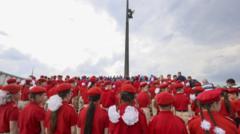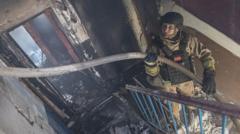Russian authorities are employing various strategies to instill pro-Russian sentiments in Ukrainian children, including youth military organizations, altered curriculums, and organized events aimed at diminishing Ukrainian national identity while promoting Russian patriotism.
Indoctrination of Ukrainian Youth: The Russian Campaign to Cultivate Loyalty

Indoctrination of Ukrainian Youth: The Russian Campaign to Cultivate Loyalty
In occupied Ukraine, Russia seeks to reshape the identities of Ukrainian children through a systematic campaign of indoctrination and education.
In the occupied regions of Ukraine, particularly in the east, children are being exposed to a campaign focused on instilling a sense of loyalty to Russia from a very young age. In Luhansk, a nursery school has children proudly displaying a long black and orange military banner representing the Russian invasion, while others are learning patriotic songs that celebrate their supposed new identity.
In Anthracite, preschoolers are even crafting items such as trench candles and blankets, ostensibly to support Russian soldiers. This initiative aims to not only erase the Ukrainian identity but to convert young Ukrainians into supporters of their occupiers. With many Ukrainian educators having left, Moscow is enticing Russian teachers to relocate to occupied areas with financial incentives.
One of the most influential organizations involved in this effort is Yunarmia, connected to the Russian defense ministry and open to children as young as eight. Their activities, which include basic military training, are intended to prepare youth for potential service. Operations in occupied Ukraine have drawn the ire of international bodies, resulting in sanctions from the EU and UK for alleged "brainwashing" tactics.
Additionally, various other Russian-backed youth programs are being implemented, such as the "Movement of the First Ones" and "Warrior," which conduct military-centric competitions reminiscent of Soviet-era practices. As children progress through the new education system, they are taught using a Russian curriculum that promotes a narrative hostile to Ukrainian history.
One person affected by this is Lisa, a former student from Donetsk who spoke out about her experiences. She described mandatory participation in parades and celebrations of Russia's legacy, making it clear that dissent was not an option in these educational environments.
Ukrainian children have also been subjected to "bravery lessons," led by Russian soldiers who glorify their actions in the ongoing conflict while casting Ukrainian forces in a negative light. Furthermore, these children are taken to exhibitions that celebrate Russia and the military operations in Ukraine.
Russia has developed various initiatives to entice Ukrainian children into visiting Russia, with claims that thousands have been relocated under the guise of fostering community and integration. However, reports suggest that over 19,000 children have been forcibly deported, with many held in re-education camps. This contravenes international law, which protects children in occupied territories.
In sum, as Russia continues its conflict with Ukraine, its ambitions extend beyond territorial control, seeking to reshape the very identities of Ukrainian youth by erasing their national heritage and replacing it with a Russian narrative.


















